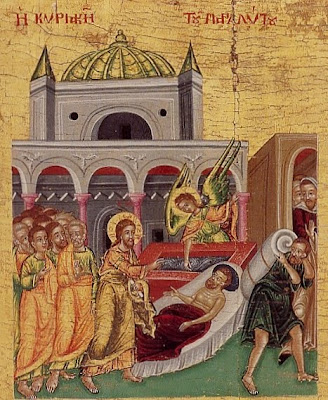In the name of the Father, and of the Son, and of the Holy Spirit, one God, Amen.
Whom would you bring, dear brothers and sisters in Christ, to the Lord for healing? Whom would I? For the Lord sees the faithfulness of those who bring the paralytic and heals him—it is, therefore, by the faithfulness of the friends that the man is healed.
Whom would we bring? Whom do we love enough that we would see them healed?
This is different from other healings; the Lord does not have a formula—a magic spell—for how to heal and sticks to it each time. For this man he does not say “Do you want to be made well?” (John 5:6) as he said to the man at the Sheep Gate nor “Go your way; and as you have believed, so let it be done for you.” (Matthew 8:13) as he said to the centurion; he was not touched, like the woman with the issue of blood (Matthew 9:20–22, Mark 5:25–34, Luke 8:43–48), nor come into the house and take the hand of the one sick (Mark 5:21–43, Matthew 9:18–26, Luke 8:40–56) as for Jairus’ daughter. Here is different: he grants to the paralytic a greater gift than to all others, “Take heart, my son; your sins are forgiven.”

And he says the same to you and he says the same to me, “Your sins are forgiven.” We are baptised for the forgiveness of sins, we go to confession for the forgiveness of sins, we receive the Eucharist for the forgiveness of sins. And our world is scandalised by this, it is appalled by this—our world wants retribution over mercy, vengeance over forgiveness, justice over love. Our world would see all receive their just deserts before mercy and compassion can have their place. Our world, like the scribes, says “This man is blaspheming.”
So the Lord, to show his power and authority over all things, grants to you and to me—alongside the paralytic—the possibility to show and share in his power. Each of us is given this role in a unique way, a personal way, a way in which we express our citizenship of the Kingdom. For some it is through healing, for some it is through feeding, for some it is through preaching the Gospel, for some it is through attending to another, for some it is through serving; for all of us it is through loving and praying, each with the possibility to bring others to Christ for their own healing.
My dear brothers and sisters in Christ, whom will we bring to the Lord? With whom will we share the great blessings we have received? For the Lord has granted that we no longer be subject to sin because Christ has defeated it, has annihilated its power. And he invites us to bring others to him to share in our blessings. Be the one who carries the infirm, the needy, the despairing—all those in need of the Lord’s healing, which is to say everyone—to Christ that they too may come to life in Christ.
To the Great Healer, our Lord and God and Saviour Jesus Christ, be all glory, honour and worship, together with his unoriginate Father and the All-holy, Good and Life-giving Spirit. Amen.
Brethren, having gifts that differ according to the grace given to us, let us use them: if prophecy, in proportion to our faith; if service, in our serving; he who teaches, in his teaching; he who exhorts, in his exhortation; he who contributes, in liberality; he who gives aid, with zeal; he who does acts of mercy, with cheerfulness. Let love be genuine; hate what is evil, hold fast to what is good; love one another with brotherly affection; outdo one another in showing honor. Never flag in zeal, be aglow with the Spirit, serve the Lord. Rejoice in your hope, be patient in tribulation, be constant in prayer. Contribute to the needs of the saints, practice hospitality. Bless those who persecute you; bless and do not curse them.
— Romans 12:6–14
At that time, getting into a boat Jesus crossed over and came to his own city. And behold, they brought to him a paralytic, lying on his bed; and when Jesus saw their faith he said to the paralytic, “Take heart, my son; your sins are forgiven.” And behold, some of the scribes said to themselves, “This man is blaspheming.” But Jesus, knowing their thoughts, said, “Why do you think evil in your hearts? For which is easier, to say ‘Your sins are forgiven, ‘ or to say ‘Rise and walk?’ But that you may know that the Son of man has authority on earth to forgive sins” he then said to the paralytic — “Rise, take up your bed and go home.” And he rose and went home. When the crowds saw it, they were afraid, and they glorified God, who had given such authority to men.
— Matthew 9:1–8
